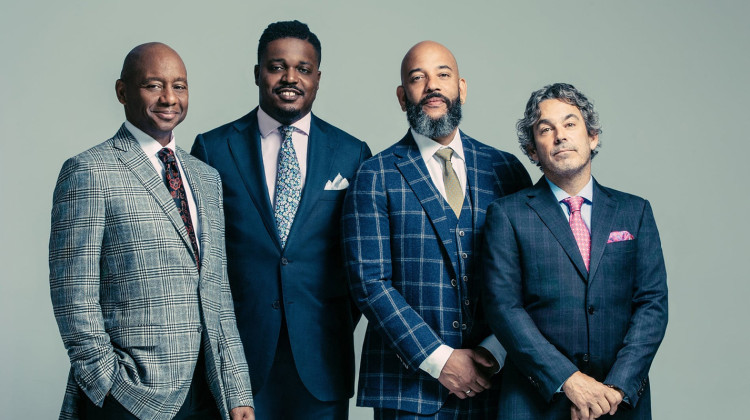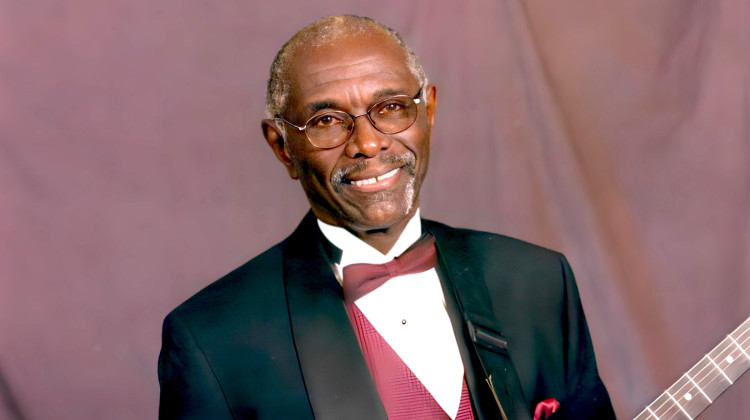Branford Marsalis has played a large role in shaping the style and sound of contemporary jazz music. He's also achieved a level of notoriety that is unusual for jazz musicians.
You might know Branford for his work as a bandleader on Jay Leno's Tonight Show, or perhaps you've heard his collaborations with rock and rap artists, including Sting, the Grateful Dead and Public Enemy. Branford Marsalis will be making two appearances in Indiana this week.
We recently spoke via zoom.
Long: Branford, I want to ask about one of your early experiences as a professional musician. I think you were a teenager when you joined Art Blakey’s legendary group, The Jazz Messengers. What was that experience? Like for you joining this iconic jazz band as a teenager?
Marsalis: You almost there I was 20. So yeah, I was I was emotionally very much a teenager. But Blakey was not really fond of me, which was fine with me because as long as he was willing to dispense the knowledge to me, I didn't need to be liked by him.
But his knowledge of music I've met few people knew as much about jazz as he did. So he was invaluable to me.
Long: And Branford you've performed and recorded with many jazz icons, including Miles Davis, to me, recording with Miles Davis seems like the ultimate credit you could attain as a musician. Was it that way for you? What did it mean to record with Miles Davis?
Marsalis: I learned a lot about how to play from that session. He wrote down some changes and said play these. And I started to play him It took me a while to figure him out. And he says, Okay, now don't play. And when I was feeling insecure, which was all the time in that session, I started looking at the sheet.
So, he made that loud whistle that he makes when he wants everything to stop. And then he took the paper and crumpled it up and threw it on the floor and said now play. And I started playing and I knew inside of it, but I was forced to react to what the band was doing.
It was really a good lesson for me. I mean, when you talk to some of the older guys, post Charlie Parker and even during Charlie Parker's time, they always talk about playing the changes playing the changes playing the changes, and I think what made Miles different was that he wanted you to learn the changes but play this out.
Long: and you have two upcoming performances in Indiana, one is here in Central Indiana at the Palladium. The other is at the IU Auditorium in Bloomington. And this is a somewhat significant venue for you. Your 1991 performance at the IU auditorium was released as a live album in 1993. Under the title Bloomington. Does Bloomington Indiana hold any significance for you?
Marsalis: I mean, I love Bloomington I love the music program. The reason we call the record Bloomington there was a debate amongst us. Me, My brother Delfeayo. I thought that the performance was incredible, but it had such an advanced tilt to it. The Delf said I don't know man, I don't think it was that good.
Delfeayo gave the tapes to my then 16 year old brother Jason, who was quite brilliant. And he fell in love with it immediately. And he called me I was listening to Bloomington the way you guys do this, that and other because he has that genius brain.
When we finally agree we will release it and I said what do you want to call it is the sound of Jason at 16 constantly calling it Bloomington like okay, Bloomington.
Long: Anything you want to share about these upcoming performances in Indiana.
Marsalis: I wish they were in June and not in January.
Long: Yeah, it is going to be cold while you're here. So yeah, be prepared.
Marsalis: You think I don't know that?
Long: Thank you so much for taking time to do this today. Branford. I'm a huge fan of your playing. And again, it was an honor to feature you on the program. I appreciate it.
Marsalis: Pleasure is mine Kyle, take care yourself.
This interview originally aired on WFYI's Cultural Manifesto.
 DONATE
DONATE







 Support WFYI. We can't do it without you.
Support WFYI. We can't do it without you.